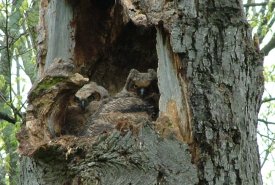Giving a hoot about owls: A night-time survey with NCC in Manitoba

Great horned owl fledglings (Photo by NCC)
On March 26, 2015, the Manitoba Region of the Nature Conservancy of Canada (NCC) hosted a Conservation Volunteers event — a night-time owl survey, which took place after sunset on NCC's Makinak Woods property east of Riding Mountain National Park. The area is characterized by aspen-dominated forests, wetlands, fens and eastern deciduous forest —common habitat types for many birds and species at risk.
Despite the spring blizzard that had brought nearly a foot of snow just a couple of days beforehand, three NCC staff members and five local volunteers braved the weather and met up for what turned out to be a successful evening in search of owls.
The night was cool, clear, and washed in moonlight. As we gathered at the meeting spot, a great horned owl let out a call from a nearby tree stand as if to signify the start of our task ahead. Staff and volunteers divided into three groups to walk or drive predetermined routes, stopping at regular intervals to listen for and identify any bird calls.
In total, we confirmed the presence of two great horned owls, including one in-flight sighting. We also spotted one possible great gray owl, although this sighting remains unconfirmed.
The call of a great horned owl is what one might call the “classic owl sound” — a haunting and eerily beautiful ho-ho-hoo hoo hoo. Meanwhile, the call of a great gray owl (our provincial bird) is deep and rhythmic.
The results of our nocturnal owl survey correlate with local accounts of owl activity in the area, and this data, taken together with the results of previous surveys, will be used to inform the management of the property. Great horned owls are fairly sedentary birds, and may remain in this same territory throughout the year or possibly the remainder of their mature lives.
The participation of local landowners and community members in these events is extremely valuable for NCC’s continued conservation efforts. While simultaneously collecting information and getting out and enjoying our protected spaces, NCC employees have the opportunity to learn from the people who love and truly know these areas. It becomes a unique bonding of both community and science-based skills and knowledge, which lends to a holistic and long-term approach to conservation in our province.


